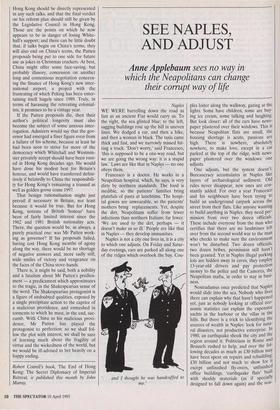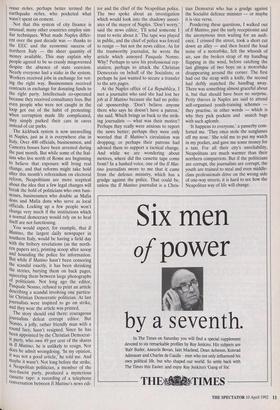SEE NAPLES, AND ADJUST
Anne Applebaum sees no way in
which the Neapolitans can change their corrupt way of life
Naples WE WERE barrelling down the road as fast as an ancient Fiat would carry us. To the right, the sea glinted blue; to the left, sagging buildings rose up the hill in uneven lines. We dodged a car, and then a bike, and then a woman in black. The taxis came thick and fast, and we narrowly missed hit- ting a truck. 'Don't worry,' said Francesco, 'this is supposed to be a one-way road, but we are going the wrong way: it is a stupid law.' Laws are like that in Naples — no one obeys them.
Francesco is a doctor. He works in a Neapolitan hospital, which, he says, is very dirty by northern standards. The food is inedible, so the patients' families bring platefuls of pasta at lunchtime. The hospi- tal gowns are unwearable, so the patients' mothers bring replacements. Yet, despite the dirt, Neapolitans suffer from fewer infections than northern Italians; far fewer. 'We are used to the dirt, perhaps — it doesn't make us so ill.' People are like that in Naples — they develop immunities.
Naples is not a city one lives in, it is a city to which one adjusts. On Friday and Satur- day evenings, cars are parked all along one of the ridges which overlook the bay. Cou- . . and I thought he was handcuffed to me.' pies loiter along the walkway, gazing at the lights. Some have children, some are buy- ing ice cream, some talking and laughing. But look closer: all of the cars have news- paper plastered over their windows. This is because Neapolitan flats are small, the housing shortage is acute, passions are high. There is nowhere, absolutely nowhere, to make love, except in a car parked at the top of the ridge, with news- paper plastered over the windows: one adjusts. One adjusts, but the system doesn't. Bureaucracy accumulates in Naples like layers of archaeological sediment. Old rules never disappear, new ones are con- stantly added. For over a year Francesco and his neighbours have been trying to build an underground carpark across the street from their flats. Like anyone wanting to build anything in Naples, they need per- mission from over two dozen officials. These include everyone from the man who certifies that there are no landmines left over from the second world war to the man who checks to make sure the environment won't be disturbed. Two dozen officials, two dozen bribes, permission still hasn't been granted. Yet in Naples illegal parking lots are hidden away in caves, they empleY 13-year-old drivers and pay protection money to the police and the Camorra, the Neapolitan mafia, in order to stay in busi- ness.
Nostradamus once predicted that Naples would slide into the sea. Nobody who lives there can explain why that hasn't happened yet, just as nobody looking at official eco- nomic statistics can explain the expensive yachts in the harbour or the villas in the hills. But there is a trick to identifying the sources of wealth in Naples: look for natu- ral disasters, not productive enterprise. In 1980, an earthquake shook the city and the region around it. Politicians in Rome and Brussels rushed to help, and over the fol- lowing decades as much as £30 billion may have been spent on repairs and rebuilding; £30 billion and not much to show for it except unfinished fly-overs, unfinished office buildings, 'earthquake flats' built with shoddy materials (as if specially designed to fall down again) and the nou-
veaux riches, perhaps better termed the earthquake riches, who pocketed what wasn't spent on cement.
Not that this system of city finance is unusual; many other countries employ sim- ilar techniques. What made Naples differ- ent over the past decade was — thanks to the EEC and the economic success of northern Italy — the sheer quantity of money available. This may explain why people agreed to be so crassly misgoverned despite the absence of state coercion. Nearly everyone had a stake in the system. Workers received jobs in exchange for vot- ing the right way. Businessmen received contracts in exchange for donating funds to the right party. Intellectuals co-operated because they received consultancy fees. But even people who were not caught in the loop got out of the habit of protesting: when corruption made life complicated, they simply parked their cars in caves instead of car parks.
The kickback system is now unravelling in Naples, just as it is everywhere else in Italy. Over 400 officials, businessmen, and Camorra bosses have been arrested during the past month. But while some of the Ital- ians who live north of Rome are beginning to believe that exposure will bring real change, and that reforms might take hold after this month's referendum on electoral reform, Neapolitians are more sceptical about the idea that a few legal changes will break the hold of politicians who own busi- nesses, businessmen who double as Mafia dons and Mafia dons who serve as local officials. Locking up a few people won't change very much if the institutions which a. normal democracy would rely on to heal itself are not functioning.
You would expect, for example, that 11 Mattino, the largest daily newspaper in southern Italy, would be having a field day with the bribery revelations (as the north- ern papers are), printing scoop after scoop and hounding the police for information. But while 11 Mattino hasn't been censoring the scandal exactly, it has been shrinking the stories, burying them on back pages, squeezing them between large photographs of politicians. Not long ago the editor, Pasquale Nonno, refused to print an article describing a scandal involving one particu- lar Christian Democratic politician. At last Journalists were inspired to go on strike, and they won: the article was printed.
The story should end there: courageous Journalists defeat corrupt editor. But Nonno, a jolly, rather friendly man with a round face, hasn't resigned. Since he has been appointed by the Christian Democrat- !c party, who own 49 per cent of the shares ° Ii Mattino, he is unlikely to resign. Nor d. oes he admit wrongdoing. 'In my opinion, It was not a good article,' he told me. And Maybe it wasn't. Not long before the strike, a Neapolitan politician, a member of the neo-fascist party, produced a mysterious cassette tape: a recording of a telephone conversation between II Mattino's news edi-
tor and the chief of the Neapolitan police. The two spoke about an investigation which would look into the shadowy associ- ates of the mayor of Naples. `Don't worry,' said the news editor, 'I'll send someone I trust to write about it.' The tape was played in public, and the chief of police was forced to resign — but not the news editor. As for the trustworthy journalist, he wrote the article which annoyed Pasquale Nonno. Why? Perhaps to save his professional rep- utation; perhaps to attack the Christian Democrats on behalf of the Socialists; or perhaps he just wanted to secure a transfer to the arts pages.
At the Naples office of La Repubblica, I met a journalist who said she had lost her job at II Mattino because she had no politi- cal sponsorship. `Don't believe anyone there who says he doesn't have a patron,' she said. Which brings us back to the strik- ing journalists — what was their motive? Perhaps they really were anxious to report the news better; perhaps they were only worried that II Mattino's circulation was dropping; or perhaps their patrons had advised them to support a tactical change. And while we are wondering about motives, where did the cassette tape come from? In a hushed voice, one of the 11 Mat- tino journalists swore to me that it came from the defence ministry, which has a grudge against the police. That could be, unless the II Mattino journalist is a Chris-
tian Democrat who has a grudge against the Socialist defence minister — or maybe it is vice versa.
Pondering these questions, I walked out of Il Mattino, past the surly receptionist and the anonymous men waiting for an audi- ence. I crossed the street, took a short cut down an alley — and then heard the loud noise of a motorbike, felt the whoosh of air, saw the broken strap of my handbag flapping in the wind, before catching the last glimpse of two boys on a motorbike disappearing around the corner. The first had cut the strap with a knife, the second had deftly snatched the handbag away. There was something almost graceful about it, but that should have been no surprise. Petty thieves in Naples are said to attend self-organised youth-training schemes — they practise, in other words — which is why they pick pockets and snatch bags with such aplomb.
'It happens to everyone,' a passerby com- forted me. 'They once stole the sunglasses off my nose.' She told me to put my watch in my pocket, and gave me some money for a taxi. For all their city's unreliability, Neapolitans are much warmer than their northern compatriots. But if the politicians are corrupt, the journalists are corrupt, the youth are trained to steal and even middle- class professionals drive on the wrong side of one-way streets, it is hard to see how the Neapolitan way of life will change.



























































 Previous page
Previous page